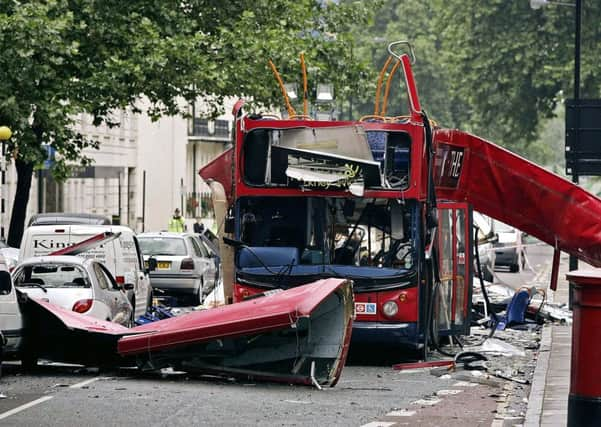7/7: Ten years on, we still can’t answer the question... WHY?


Why did four suicide bombers, three of whom with strong links with Leeds and Dewsbury, become so detached from society that they were prepared to become jihadists and slaughter 52 innocent commuters in London?
Why are impressionable young people – misguided fanatics like 17-year-old Dewsbury student Talha Asmal leaving their friends and family in the UK to join the Isis terror struggle in Syria and Iraq and, in the case of Asmal, take their own life and others by detonating a car packed with explosives? What is it that motivates parents to voluntarily take their children into a war zone, as families from Bradford and Luton have done, when hundreds of thousands of people are doing all they can to find safety and sanctuary in Europe?
READ MORE...
Advertisement
Hide AdAdvertisement
Hide AdVideo special: Beeston, Leeds - 10 years after 7/7The emotional moment when 7/7 survivor met the PC who saved her lifeVideo: Angry but not bitter, 7/7 survivor Gill Hicks revisits BeestonAnd why, exactly a decade after Tony Blair declared that Britain would defeat this terrorism, is the country struggling to confront the seductive myths peddled by Islamists?
In the tragedy’s aftermath, the Number 30 red bus blown to smithereens in Tavistock Square signified a shocked nation’s defiance. Its wheels refused to buckle - despite the full ferocity of a blast which claimed 13 lives. That day’s events also inspired extraordinary acts of compassion that continue to be exemplified by the unwavering spirit of those 7/7 survivors, like the indomitable Gill Hicks, who have devoted their lives to forging better relations with Muslim community leaders and vice-versa.
Their hope and humility, as the nation falls silent today in remembrance, represents the best of Britain and was self-evident when Ms Hicks, who lost both of her legs in the Tube explosion at Russell Square, led a special peace walk in London with, among others, Leeds imam Qari Asim.
Such unity, coming so soon after Ms Hicks made a difficult pilgrimage to Beeston to see where three of the bombers grew up, sets an incredible example to the country at large about the power of humanity to make a difference, and the positive work taking place locally.
Advertisement
Hide AdAdvertisement
Hide AdIn recalling how strangers saved her life, her resolve has not been diminished by life-changing injuries: “Our unity can offer the strength to not only deter anyone from following the path of violent extremism, but to also build a sustainable peace.”
She is not alone – Nick Baines, the Bishop of Leeds, is among those who have asked why policies to counter extremism have not been more successful. He believes inspiration, and not education, is critical to this process.
However the wisest of words, even more profound in the wake of the recent terrorist outrage in Tunisia, will only suffice if politicians and policy-makers consign the language of the so-called ‘War on Terror’ to history. The assault on America’s liberty was 14 years ago – and such rhetoric oversimplifies a set of complex and interwoven global and domestic challenges which are integral to the ‘why?’ conundrum.
Ten years ago, al-Qaida and the Taliban were the enemy. Now they are now joined by Isis, al-Shabaab, Boko Haram and others. Their impact is felt across the globe and Mark Rowley, an Assistant Commissioner with the Metropolitan Police, has spoken of a “very different” security challenge to 2005 because Isis has the ability to “reach into people’s homes in terms of recruitment”.
Advertisement
Hide AdAdvertisement
Hide AdThis is due to an unprecedented digital revolution which has offered these groups a powerful way to recruit from these shores. Social media, only in its infancy a decade ago, is being exploited to deliberately target those from working class backgrounds led to believe, erroneously, that Britain has given up on them. Why has a more effective way not been found to counter this? Why has David Cameron been accused of demonising Muslims following his recent policy speech? And why can more not be done to highlight the positive influence of those young Muslim role models who embrace British values while remaining committed to their faith?
As such, the time has come for a complete reappraisal of policies on integration and social cohesion so British values benefit all in a diverse multi-cultural society. For this reason, The Yorkshire Post intends to hold a major symposium, which will bring together community leaders with political and religious figures to discuss what can be done here to promote a new era of tolerance and mutual understanding. We hope it will also shape the national debate that we now challenge the Prime Minister to lead.
The 7/7 atrocity was an attack on the whole country and it falls to all to stand together in the face of those who want to divide us. For, if not, the unanswered question of the past decade – why? – will only come back to haunt Britain at a future date.